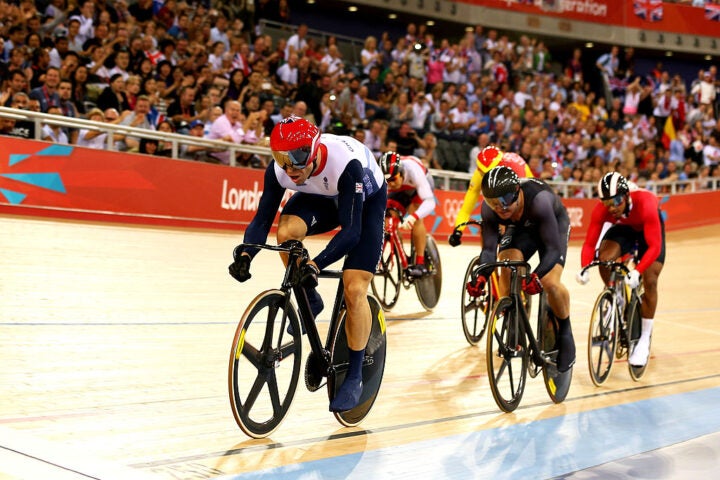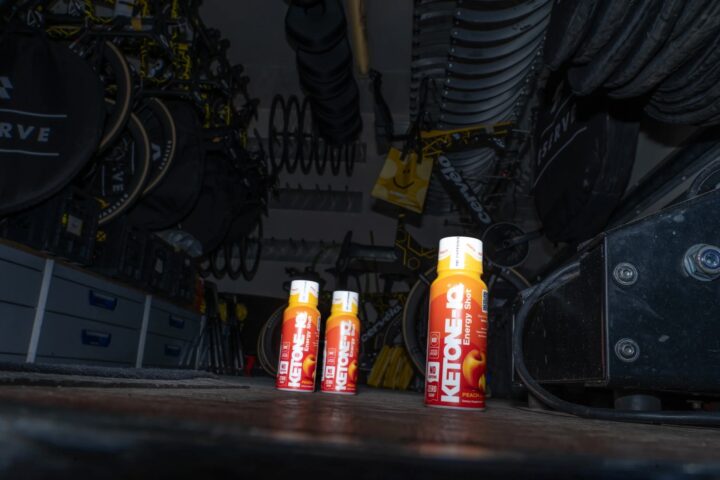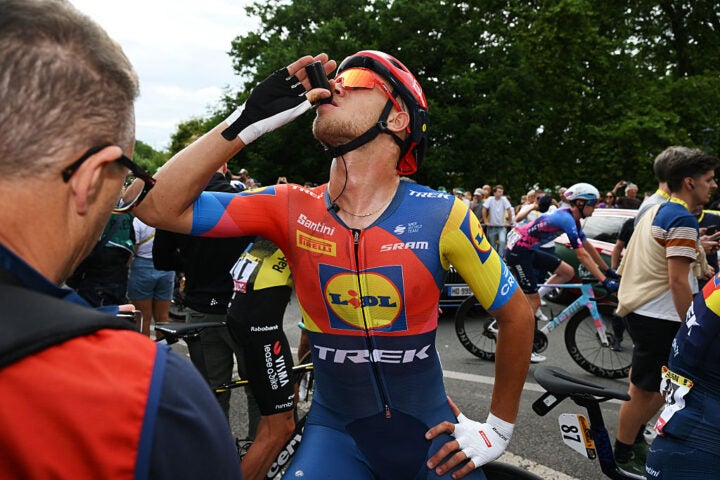“], “filter”: { “nextExceptions”: “img, blockquote, div”, “nextContainsExceptions”: “img, blockquote, a.btn, a.o-button”} }”>
Ketones are on the brink of completing a Tour de France redemption arc.
A so-called “U.S. Special Forces Drink” that was once shrouded by suspicion and speculation is now one of the most guzzled supplements in the modern peloton.
And it seems they’re also on the brink of being given the full green light by the overlords of cycling.
Reports this week out of Cycling Weekly suggest a long-running trial by the UCI will confirm there are no health risks associated with taking ketone esters.
It should clear any remaining doubt from a chemical concoction that’s openly swigged – and actively promoted – by the teams of Jonas Vingegaard, Remco Evenepoel, and Mathieu van der Poel.
Cycling Weekly says the news will be made official soon after the Tour de France.
Velo contacted the UCI for comment or clarification but has not yet received a response.
If true, any imminent “approval” has been hella long time coming.
What were once the subject of tabloid fearmongering and sporting consternation are now the backbone of a multi-million industry.
Ketones have joined “green drinks” and meal replacement powders in the pantries of biohackers and self-improvement gurus all over the world.
They’re shilled on podcasts [including that of former yellow jersey Geraint Thomas], swilled by leading ultra runners, and fronted by protagonists of the 2025 Tour de France.
From university labs to pro cycling, via the US Special Forces
 Ketones provoked all sorts of consternation when it was reported they were secretly trialed by British athletes in 2012. (Photo: Bryn Lennon/Getty Images)
Ketones provoked all sorts of consternation when it was reported they were secretly trialed by British athletes in 2012. (Photo: Bryn Lennon/Getty Images)
What might an official green light mean for ketones and the Tour?
Both a lot and nothing, all at once.
Ketones have been one of the most divisive topics of the last decade of Le Tour.
Synthetic ketone esters provide the body a second source of substrate beyond carbohydrate to help enhance performance, concentration, and recovery.
They’re perfect fodder for the attrition of the world’s most intense race.
Indeed, they pack so much performance potential that the MPCC has been steering its members away from the mystery substance until the UCI stamp of 100 percent approval.
Leading French riders and managers stirred further concern with comments that made ketones the devil’s work and a symptom of “a peloton at two speeds.”
In fairness, the furor is reasonable given ketones have an “origin story” worthy of a Hollywood script.
These bitter concoctions bubbled out of university labs in the early 2000s after they were commissioned by the U.S. Special Forces.
A project named “Metabolic Dominance” called for a magic potion to power operatives in the most extreme environments.
When it emerged that the results were secretly slurped by British Olympians at the London Games and then potentially also Team Sky, it became the scandal of the post-Armstrong era.
The MPCC recently warned that ketones “threaten the credibility of the sport.”
The group “recommends, or even prohibits” its 7 men’s WorldTour teams and 16 ProTeam members from the supplement.
Visma-Lease a Bike becomes ketone guinea pigs
 Many top teams – including Visma-Lease a Bike – have partnerships with Ketone manufacturers. (Photo: Courtesy Ketone-IQ)
Many top teams – including Visma-Lease a Bike – have partnerships with Ketone manufacturers. (Photo: Courtesy Ketone-IQ)
But time moves fast in elite sport.
The majority of the peloton moved beyond seeing ketones as a pariah even before the start of the Pogi era.
The UCI’s call for riders to “refrain” from ketones prior to the publication of its long-awaited report didn’t stop Visma-Lease a Bike, Soudal Quick-Step, and Alpecin-Deceuncink from signing high-profile partnerships with ketone brands.
Dozens more riders use ketones, whether through team suppliers or independent purchase.
“People seem to think ketones are some wonder supplement that completely changes performance. But they’re not some magic potion” Visma’s head of performance Mathieu Heijboer once told Velo.
In fact, Visma-Lease a Bike is so confident about ketones that the super team was happy to become guinea pigs for a study led by its partner, Ketone-IQ.
The multi-million U.S. brand recently released results that promise increased natural production of EPO, the endurance super hormone that stimulates red blood cell production.
Improved muscle oxygenation and efficiency, and faster recovery, were other headline features of the Ketone-IQ report.
Naturally, the brand-funded study didn’t point out any possible drawbacks. Nor did it refute research that suggests ketones are possibly just placebos, at best.
Just another marginal gain of the Tour de France
 Tour de France stage-winner Milan guzzles what appears to be a ketone shot after at the finish of the grand départ. (Photo: Dario Belingheri/Getty Images)
Tour de France stage-winner Milan guzzles what appears to be a ketone shot after at the finish of the grand départ. (Photo: Dario Belingheri/Getty Images)
Velo contacted the MPCC for comment on the outcome of the UCI study and is awaiting response.
Adam Hansen, leader of the CPA riders’ group, raced through the rise of ketones. He told Velo the peloton’s decade-long ketone debate was “blown up to something bigger than it really was,” but preferred not to provide an official CPA stance.
It’s estimated that at least 70 percent of the peloton of the 2025 Tour de France is taking ketones, primarily to enhance recovery.
That percentage could be even greater in 2026. Should the UCI fully green-light ketone esters, the MPCC would likely have no choice but to soften its stance – and widen the market.
Ketones were once the scary monster of the Tour de France.
A decade later, they’re the biggest non-issue of the bunch.
